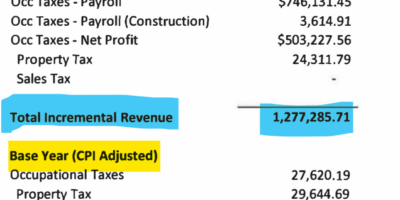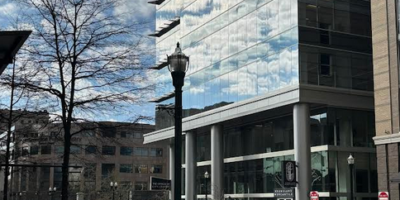By Mary Grace Barry
In late February, this email showed up twice in my inbox:
“Vote Lexington! The Bloomberg Mayors Challenge is nearing the finish line. This is a competition for the best ideas to improve cities. Our idea, CitizenLex.org, created by our citizens for all citizens, is up against ideas from 19 other cities nationwide. Million-dollar prizes are at stake. Starting today, you have the opportunity to Vote Lexington at www.huffingtonpost.com/mayors-challenge. Vote Lexington at the Huffington Post site, now through March 6. Tell your friends, tell your family, use Facebook and Twitter, tell everyone…Vote Lexington!”
(Didn’t you get it? Must not be on the city’s email blast list. Or, you’re not in the right network. Hopefully, we’ll have a website to ameliorate that soon.)
The Bloomberg Mayor’s Challenge is a contest to spur national innovation through initiatives developed in cities, initiatives that can be replicated in other cities. In other words, it’s an attempt at an end run around national governmental programs in a time when the capacity (or will) of federal government to address problems seems to be floundering. Bloomberg Philanthropies will pony up $9 million to the “five boldest ideas”: $5 mil to the winner, $1 mil to the next four runners-up. 305 cities submitted proposals; 20 finalists were chosen; Lexington is in that 20 (hence the email).
When the call went out last year, Lexingtonians got pretty jazzed about the contest; as Mayor Gray writes in his proposal for the contest: “More than 7,000 Lexingtonians participated and we got 440 ideas…one for every 682 citizens!” (Vote Lexington [Exclamation Point]!) I can attest to the enthusiasm: more than one friend of mine submitted a pitch, and NoC published its own last August.
Evidently, all those good ideas overwhelmed the city because Lexington’s proposal turned out to be embarrassingly mundane: CitizenLex.org, which sounds to be a website that gathers data and “empowers” citizens. From the proposal: “CitizenLex helps citizens make the change they want. Rather than just another engagement platform, in which people make suggestions to the city or the city seeks citizen input on pre-selected issues, this platform encourages citizens to do their own problem-solving—with help. And. That. Is. A. Very. Big. Deal.”
Rhetorical flourishes aside, CitizenLex doesn’t sound like a very big deal—not if you’re already an active participant in the workings of our community. And maybe not even if you’re Joe Schmoe Couch Potato who only goes to the grocery store and to buy your gaming equipment at your favorite Big Box Store. It just sounds like more bureaucracy. The “knowledge management system” will create more city officials to coach residents on “problem-solving”: two City Innovation directors, project leaders, and Innovation Mentors.
Show me the money
Anyone thinking, I thought the biggest challenge facing the city and residents was money for projects, not information about them? (That’s certainly the case in my area.) In the city’s initial proposal, the knowledge management system gets a bit under one-third of the $5 million prize, if Lexington were to take first place. Of the proposal projects that cover the initial three years, $1.3 million would go into the website and personnel for the project; a group of health projects would garner $1 million; educational projects $750,000; a governmental efficiency training $100,000; and future projects to be culled from CitizenLex.org would lasso the remaining $1.85 million of the prize.
The health and education programs slated for funding in that original proposal, while important, aren’t necessarily new for the city. The Better Bites food program will be extended from city parks to schools, and more bike lanes and walking trails will be constructed. In terms of education, the Fayette County Schools Delivery-to-Diploma program will be expanded for underserved students. This let’s-create-a-big-system-for-what-we deem-to-be-small-scale projects approach can be interpreted several ways.
First, it can be seen as representative of the scale of our city; citizens submitted projects that, according to the mayor, “needed only modest funding and had short timelines.” In my opinion, this scale issue is one of Lexington’s strengths: there are lots of residents engaged in micro-projects that enhance our quality of life.
But, the decision to pitch a data project, even if it’s under the guise of an incubator for citizen engagement, can also be construed a second way: an inability to see how smaller projects (healthier foods, walking trails, educational projects) are part of larger vision for Lexington, for the Bluegrass, for Kentucky as a whole. In other words, surely the city (and by “city” here I mean the government and citizens) could figure out how to spend an entire $5 million on health and health-oriented infrastructure. Ditto for education. These are huge problems for our state. The Bloomberg Mayors Challenge gave Lexington the opportunity to think big about these issues without thinking “state funds” or “federal government.” And the city chose not to.
There’s a third way to interpret the project choice: as a symptom of Lexington’s issue with shallow branding and genuine identity. Choosing a data system, rather than a program that speaks to the conditions and needs of our city—in other words, to the character of our city—is an indicator of Lexington’s on-going vacuous sense of identity.
Data junkies
To be fair, Lexington isn’t the only finalist to uncritically trumpet data collection as the panacea for urban woes or the lynchpin for urban progress. Boston, for example, wants to scale down the big data model so that parents can share their children’s “data” with schools, coaches, daycare facilities, neighbors, and liaisons (which may mean police). Information like grades and attendance can be disseminated through a data locker parents keep on their children. To me, this sounds like Boston wants to subject youth to Big Brother, or rather Big Parent, in which data consumed by adults will be used to haunt and control kids lives. What used to be a bad reputation will now be bad data. Good luck, kids.
Or, good luck pregnant moms. Cincinnati, which has an alarming infant mortality rate (more than twice the national average), wants to track all pregnant women in a “secure database that follows [a mother] through the pregnancy and measures the interventions she receives.” The city has already deduced that most of the infant mortalities occur in five counties; in the tried-and-true do-it-to-poor-folks-first method, five years ago the city began implementing this tracking program with low-income mothers. Now the city wants to move on to all pregnant women. Of course we all want a low infant morality rate for every socio-economic class, but a governmental program that gathers women’s reproductive data and health care plans violates a woman’s right to privacy. More. Big. Brother.
Other cities, like Chicago and Hillsboro, OR, also stress data, although not to such creepy ends. In a jargon of meaninglessness, Chicago wants to implement the “first open-source predictive analytics platform that will help leaders make smarter, faster decisions in real-time to help address and prevent problems before they develop.” If you can’t figure out what that means in concrete terms, think “proactive solutions.” If you aren’t sure what that vague and redundant phrase means, consider what Mayor Rahm Emanuel suggests it means: “Chicago’s SmartData platform turns ‘thinking’ into ‘doing.’ It turns ‘react’ into ‘anticipate.’” (Yep, you’re right, it means nothing more than a newer information system.)
I’ll pause here to concede a few points: 1) cities need information for planning, maintenance, and quick responses to urgent needs; 2) that data needs to be organized and accessible across all branches of local government; 3) cities need money to update such large systems. I’ll also grant you that many city officials and staff members do really want to improve their cities—I’ve met many of them here in Lexington. I will not concede, though, that governmental versions of big data are either innovative or prize-worthy. Let me give an anecdote that has soured me on this notion of self-perpetuating data collection.
My neighborhood has a very responsive councilmember and legislative aid. With them, we have been pursuing remedies for violence and infrastructure deterioration in our neighborhood for the last several years. At a recent meeting, our councilmember recruited a new city official who specializes in our types of problems. In this face-to-face conversation, we laid out the same issues we’ve been articulating for at least three years.
This new official, after we had outlined the problem, said, “What we’ll need to do next is lay out all the issues.” My response: (clearly annoyed tone) “That’s what I thought we were doing right now.” He had listened (I assume, his eyes were open at least), but had not taken one note. Evidently, he wanted us to, again, write out all the problems occurring. He was sitting in the room with 80 percent of the stakeholders—residents, the district councilmember, the sector’s police commander, himself (a commissioner)—and still he couldn’t pull the “data” together enough to offer a provisional plan. I have a hard time believing more analytics are going to help this official nudge forward the change we need.
But, you say, that is just one example. Ok, true. Then let’s talk about how many times the city council has “studied” (often with a price tag) the benefits of an affordable housing trust fund, or how long the completion of the Legacy Trail has been languishing—and the list could go on. These very worthy projects aren’t blocked because of lack of data. They’ve stagnated because of money.
In part two, Mary Grace will air her thoughts on why blemishes help constitute a city’s character and why methods of data collection don’t.




Leave a Reply